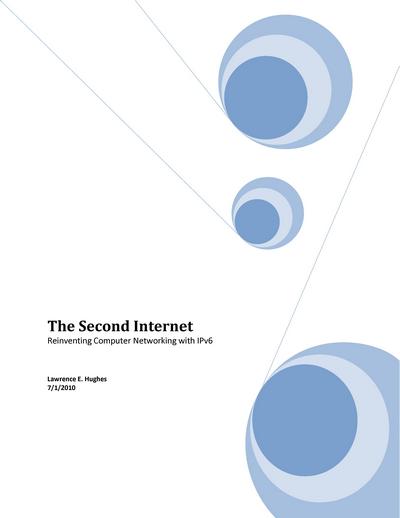
The Second Internet: Reinventing Computer Networking with IPv6
This book helps engineers build a bridge from what they know of IPv4 to the new concepts of IPv6. Includes a series of very detailed labs that can be done with generic PCs and open source software, to create a full featured IPv6 testbed network.
Tag(s): Data Communication and Networks
Publication date: 07 Jan 2010
ISBN-10: 0982846304
ISBN-13: 9780982846308
Paperback: 306 pages
Views: 8,847
Type: Book
Publisher: n/a
License: Creative Commons Attribution-No Derivative Works 3.0 United States License
Post time: 02 Dec 2016 06:00:00
The Second Internet: Reinventing Computer Networking with IPv6
 This book helps engineers build a bridge from what they know of IPv4 to the new concepts of IPv6. Includes a series of very detailed labs that can be done with generic PCs and open source software, to create a full featured IPv6 testbed network.
This book helps engineers build a bridge from what they know of IPv4 to the new concepts of IPv6. Includes a series of very detailed labs that can be done with generic PCs and open source software, to create a full featured IPv6 testbed network.
Publication date: 07 Jan 2010
ISBN-10: 0982846304
ISBN-13: 9780982846308
Paperback: 306 pages
Views: 8,847
Document Type: Book
Publisher: n/a
License: Creative Commons Attribution-No Derivative Works 3.0 United States License
Post time: 02 Dec 2016 06:00:00
Share — copy and redistribute the material in any medium or format for any purpose, even commercially.
The licensor cannot revoke these freedoms as long as you follow the license terms.
Click here to read the full license.
Lawrence E. Hughes wrote:Why is 2011 a Significant Year for the Second Internet?
There is an entire chapter in this book on the depletion of the IPv4 address space. What this means (in English) is that we are running out of IP addresses for the First Internet. This will be a very important event in the history of the Internet. We nearly ran out in 1997, and only managed to keep the Internet going through some clever tricks (NAT and Private Addresses), kind of like using private extension numbers in a company PBX phone system. However, even with this trick (which is now causing major problems), we are about to run out for good. The folks that create the Internet don’t have any more clever tricks up their sleeves. All the groups that oversee the Internet, like the Internet Assigned Numbers Authority (IANA), the Internet Corporation for Assigned Names and Numbers (ICANN), the Internet Society (ISOC), the Internet Engineering Task Force (IETF) and the Regional Internet Registrars (ARIN, RIPE, APNIC, LATNIC and AFRINIC) have been saying for some time that the world has to migrate now. They should know. They are the ones that give out IP addresses. They know that the barrel is almost empty. We’ve got to increase the number of unique Internet addresses, which has some far reaching consequences.
Tweet
About The Author(s)
Lawrence Hughes is a computer security expert with more than 35 years of experience in creating and developing security products. He was the co-founder of CipherTrust (along with Jay Chaudhry), which became the leading company in E-mail security, including corporate Anti-Spam. His specialties include: creation of new companies, niche analysis and product creation, Internet security, cryptography, PKI, IPv6, E-mail, DNS, etc.

Lawrence Hughes is a computer security expert with more than 35 years of experience in creating and developing security products. He was the co-founder of CipherTrust (along with Jay Chaudhry), which became the leading company in E-mail security, including corporate Anti-Spam. His specialties include: creation of new companies, niche analysis and product creation, Internet security, cryptography, PKI, IPv6, E-mail, DNS, etc.